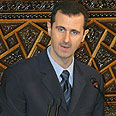

There is nothing new about Syria’s deceptive act in Lebanon, about its terrorist assassinations or the actions of Syrian agents in that country.
Syria has been carrying on in similar fashion in and around Lebanon for decades.
But now, the humiliating sight of Syrian President Bashar Assad hanging on to Lebanon by the skin of his teeth, trying to dupe the world into accepting some sort of half-pullout of Syrian forces, should be food for thought for many Israelis.
More than a few people here joyfully bought into former president (and father of current leader) Hafez
For many people, including loyal Israeli patriots at that, the prevailing wisdom a decade ago was that if Israel failed to seize the chance to finalize a peace treaty, the responsibility for that failure would fall primarily on Israeli shoulders.
Such was the level of Israeli self-hatred.
But the current chain of events in Lebanon should set the whole story of Israel-Syria negotiations in a different light.
Many Israelis have come to understand that Syria’s words and Syria’s intentions do not always match up. Syria’s actions are designed for one purpose, and one purpose only: to serve Damascus’ narrow ethno-governmental interests.
How much more so when speaking about two countries, Israel and Lebanon, whose very existence Syria considers illegitimate?
According to Damascus, both should rightly be considered part of “Greater Syria”, an illusion that drives Syria to send a loyal band of terrorist thugs to enforce its diktats. So it was during Lebanon’s Civil War, so it continues to be with Syria’s support for Hamas and Islamic Jihad terror attacks against Israel.
As always, Syria has been careful to keep it’s hands clean by employing agents—Shi’ites, Palestinians, Israeli Arabs, Druze— to do it’s bidding, so that it will be impossible to accuse Damascus. This pattern continues today in Iraq.
The United States has yet to figure out just what to do with Bashar Assad’s defiant regime in advance of Lebanon’s approaching parliamentary elections in May. But even if Syria pulls completely out of Lebanon, it will surely continue to exert its influence from afar, it has done (and continuse to do) with the Palestinians.
In the short term, there is no question that the international community must isolate Syria. But in the longer term, there would appear to be no solution to the Syria problem other than democratic elections —that will apparently have to be enforced by foreign elements- to return the Syria’s Sunni majority to power.
There is no way to reign in the Baathist dictatorship’s involvement in terrorism other than to dismantle the entire regime. There is no reason for the world to act differently towards Baathist Syria than it did towards Baathist Iraq.
Only then will it be possible to truly remove Syria from Lebanon, to do away with Syrian support for Palestinian terror organizations, and to create the first chance for a real, lasting Israel-Syrian peace. Until then, we will continue to see more of Syria’s tricks and deceipt.















